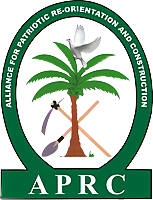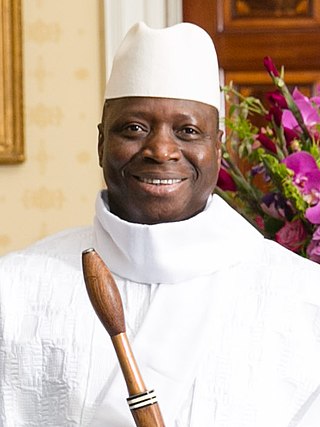 |
|---|
General elections were held in the Gambia on 26 May 1966. They result was a victory for the ruling People's Progressive Party, which won 24 of the 32 elected seats. [1] Voter turnout was 71.1%. [2]
 |
|---|
General elections were held in the Gambia on 26 May 1966. They result was a victory for the ruling People's Progressive Party, which won 24 of the 32 elected seats. [1] Voter turnout was 71.1%. [2]
| Party | Votes | % | Seats | +/– | |
|---|---|---|---|---|---|
| People's Progressive Party | 81,313 | 65.32 | 24 | +6 | |
| United Party | 21,703 | 17.43 | 4 | – | |
| Gambia Congress Party–United Party | 19,846 | 15.94 | 4 | – | |
| Independents | 1,630 | 1.31 | 0 | 0 | |
| Total | 124,492 | 100.00 | 32 | 0 | |
| Registered voters/turnout | 175,732 | – | |||
| Source: Hughes & Perfect, [3] Sternberger et al. [4] | |||||
Of the four seats won by the United Party-Gambia Congress Party coalition, the United Party took three and the Gambia Congress Party one. [1]

Elections in Guyana take place within the framework of a multi-party representative democracy and a presidential system. The National Assembly is directly elected, with the nominee of the party or alliance that receives the most votes becoming President.

The Alliance for Patriotic Reorientation and Construction (APRC) is a political party in The Gambia. Founded by army officers who staged a coup in 1994, it was the dominant ruling party from 1996 until 2016 with president Yahya Jammeh.

The People's Progressive Party is a political party in the Gambia. It was the dominant ruling party of the House of Representatives and the presidency from 1962 to 1994. The president throughout this time period was Dawda Jawara. The People's Progressive Party lost power after the 1994 Gambian coup d'état, a military coup led by young, junior military officers. The Alliance for Patriotic Reorientation and Construction (APRC) then became the dominant party of the Gambia. The People's Progressive Party remains active, but lacking the same level of support it garnered in the 20th century.

The People's National Congress Reform is a social-democratic and democratic socialist political party in Guyana led by Aubrey Norton. The party currently holds 31 of the 65 seats in the National Assembly. In Guyana's ethnically divided political landscape, the PNCR is a multi-ethnic organization.

Parliamentary elections were held in Austria on 6 March 1966. The result was a victory for the Austrian People's Party (ÖVP), which won 85 of the 165 seats. Voter turnout was 94%.

Pierre Sarr N'Jie was a Gambian lawyer and politician who served as the Chief Minister of the Gambia from 1961 to 1962. He was the country's first head of government following the declaration of self-rule in 1961. From 1952 until 1977, he was leader of the United Party. He was also a member of the House of Representatives from 1960 to 1972, and de facto Leader of the Opposition for a period, opposite Dawda Jawara.

Parliamentary elections were held in Ghana on 29 December 1992, the first since 1979. Voter turnout was just 28.1% amidst a boycott by opposition parties, who had claimed the preceding presidential elections in November – won by former military ruler Jerry Rawlings with 58% of the vote – were fraudulent, with international observers considering them not to have been conducted in a free and fair manner.

General elections were held in Sierra Leone on 25 May 1962, just over a year after the country gained independence from the United Kingdom. This was the first to be held under universal suffrage. The elections were won by the ruling Sierra Leone People's Party (SLPP), although the party received fewer votes than independent candidates. SLPP leader Milton Margai remained Prime Minister.

An election for the one elected seat on the Legislative Council was held in the Gambia in 1947. It was the first time that the Council had had a directly elected representative.

General elections were held in the Gambia on 29 April 1992. The election date was announced on 14 February and the National Assembly was dissolved three days later. Although he had announced his retirement in December 1991, President Dawda Jawara changed his mind and ran for the position again. Both elections were won by the ruling People's Progressive Party (PPP), with Jawara remaining president, winning 58.5% of the vote. Voter turnout was around 55.8%.

General elections were held in Malawi on 17 May 1994 to elect the President and National Assembly. They were the first multi-party elections in the country since prior to independence in 1964, and the first since the restoration of multi-party democracy the previous year. The Malawi Congress Party (MCP), which had governed the country since independence, was decisively beaten by the United Democratic Front (UDF). Former President-for-life Hastings Banda, in power since independence, was defeated in by the UDF's Bakili Muluzi, who took 47 percent of the vote to Banda's 33 percent.

The Democratic Congress Alliance was a political alliance in the Gambia. It was formed in the run-up to the 1960 general election by the Democratic Party and the Muslim Congress Party.

General elections were held in Northern Rhodesia on 20 and 21 January 1964. There were two voter rolls for the Legislative Council, a main roll that elected 65 seats, and a reserved roll that elected 10. Africans elected the main roll, whilst Europeans elected the reserve roll. Other ethnicities were allowed to choose which roll to be part of. The United National Independence Party won the elections, taking 55 of the common roll seats. Its leader, Kenneth Kaunda became Prime Minister, leading the country to independence in October that year, at which point he became President. Voter turnout was 94.8% for the main roll and 74.1% for the reserved roll.

General elections were held in Zambia on 19 December 1968 to elect the National Assembly and President. The first post-independence polls saw incumbent Kenneth Kaunda retain his post as president, whilst his United National Independence Party, the only party to field candidates in all 105 constituencies, won 81 of the 105 seats in the National Assembly. Voter turnout was 82.5% in the parliamentary election, but 87.1% in the presidential election.

General elections were held for the Legislative Council in Nyasaland in August 1961. The result was a victory for the Malawi Congress Party, which won all 20 lower roll seats and two of the eight higher roll seats.

Parliamentary elections were held in Nigeria on 30 December 1964, although they were not held until 18 March 1965 in some constituencies in Eastern Region, Lagos, and Mid-Western Region due to a boycott in December. The election saw most parties run as part of alliances, the Nigerian National Alliance and the United Progressive Grand Alliance.
The African National Congress was a political party in Trinidad and Tobago. The party first contested national elections in 1961, when it received just 0.5% of the vote and failed to win a seat. They did not put forward any candidates for the 1966 elections, but returned for the 1971 elections, in which they received 2.4% of the vote, but again failed to win a seat as the People's National Movement won all 36. The party did not contest any further elections.

Parliamentary elections were held in the Gambia on 29 March 2012. The ruling Alliance for Patriotic Reorientation and Construction (APRC) won 43 of the 48 elected seats.
Parliamentary elections were held in Hungary on 19 March 1967. The Hungarian Socialist Workers' Party was the only party allowed to contest the elections, and won 259 of the 349 seats, with the remaining 90 going to independents selected by the party.

The People's Liberal Party was a political party in Bulgaria.